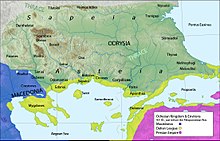Bistones
Bistones(Greek:"Βίστονες") is the name of aThracianpeople who dwelt betweenMount Rhodopéand theAegean Sea,besideLake Bistonis,nearAbdera[1]extending westward as far as the riverNestus.[2]It was through the land of the Bistones thatXerxesmarched on his invasion of Greece (480 BC).[1]The Bistones continued to exist at the time when the Romans were masters ofThrace.[2]Roman poets sometimes use the names of the Bistones for that of the Thracians in general.[2]Plinymentions one town as belonging to the Bistones:Tirida;the other towns on their coast,Dicaea,Ismaron,Parthenion, Phalesina andMaronea,were Greek colonies.[2]
Mythology
[edit]The Bistones were militant people who worshipedAres,DionysusorBacchus,Minerva,[2]andBellona.[3]
In the playAlcestisbyEuripides,the mythicalHeraclesis on his wayto the land of the Bistonesin his labour forTirynthianEurystheusto fetch thechariot-steedsofThracian Diomedes.[4]The Thracian Diomedes was king of the Bistones.[5]
TheArgonautica(line 78) impliesOrpheusis king of BistonianPieria,[3]succeeding his mortal father,King Oeagrus.Orpheus is also said to have been killed by Bistonian women.[6]
From the worship of Bacchus (Dionysus) in Thrace, Bacchic women are calledBistonides.[1]Similarly, in some Latin poems,Edonisare Bacchic women from the Thracian tribeEdoni.
Some traditions state thatPhineuswas killed byBoreas,or that he was carried off by theHarpyesinto the country of the Bistones or Milchessians.[7]
According to another mythBistonfounded the Bistones tribe.[3]

References
[edit]- ^abcSmith, William, ed. (1878).A New Classical Dictionary of Greek and Roman Biography, Mythology and Geography.New York: Harper & Brothers, Publishers, Pearl Street, Franklin Square. p. 143. ark:/13960/t5q818b4j.
- ^abcdeSmith, William, ed. (1870).Dictionary of Greek and Roman Geography.Vol. 1. Boston: Little, Brown, and Company. p. 403. ark:/13960/t14m93874.
- ^abcKroll; Wissowa; John; Ziegler; Witte; Mittelhaus; Gärtner (eds.).Paulys Realencyclopädie der classischen Altertumswissenschaft (RE).Vol. Band III, 1 (1897), column 504-505. Wikimedia Commons.
- ^"Alcestis (468-529)".The Plays of Euripides.Vol. 1. Translated by Coleridge, Edward P. London: G. Bell And Sons, Limited. 1910. p. 130. ark:/13960/t6tx37b16.
- ^Smith (1870)Dictionary of Greek and Roman GeographyVol 1 p. 1026
- ^Phanocles,fragment 1 Powell = Stobaeus, Eclogae 20.2.47, Iv 461-2 Hense.(2014). Retrieved 16 September 2022
- ^Smith, William, ed. (1870).Dictionary of Greek and Roman Biography and Mythology.Vol. 3. Boston: Little, Brown, and Company. p. 336. ark:/13960/t23b60t0r.
